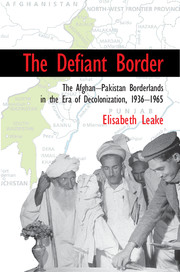Book contents
- Frontmatter
- Contents
- Preface and Acknowledgments
- List of Abbreviations
- Maps
- Introduction: “A Doughty and Honourable Opponent”: Historicizing the Afghan– Pakistan Borderlands
- 1 “Using a Crowbar to Swat Wasps”: The Frontier Tribal Area in Imperial Defense
- 2 The “Opening of Sluice- Gates”: Plan Partition and the Frontier
- 3 “We Are One People and Ours Is a Land”: The Demand for Pashtunistan, 1948–1952
- 4 A “Friendly Point of Return”: Pakistan and the Global Cold War
- 5 An “Eye for an Eye”: Mohammad Ayub Khan and the Collapse of Regional Relations
- Conclusion: “Religion, Land, Lineage and Honour”: The Afghan–Pakistan Borderlands Then and Now
- Index
1 - “Using a Crowbar to Swat Wasps”: The Frontier Tribal Area in Imperial Defense
Published online by Cambridge University Press: 20 January 2017
- Frontmatter
- Contents
- Preface and Acknowledgments
- List of Abbreviations
- Maps
- Introduction: “A Doughty and Honourable Opponent”: Historicizing the Afghan– Pakistan Borderlands
- 1 “Using a Crowbar to Swat Wasps”: The Frontier Tribal Area in Imperial Defense
- 2 The “Opening of Sluice- Gates”: Plan Partition and the Frontier
- 3 “We Are One People and Ours Is a Land”: The Demand for Pashtunistan, 1948–1952
- 4 A “Friendly Point of Return”: Pakistan and the Global Cold War
- 5 An “Eye for an Eye”: Mohammad Ayub Khan and the Collapse of Regional Relations
- Conclusion: “Religion, Land, Lineage and Honour”: The Afghan–Pakistan Borderlands Then and Now
- Index
Summary
In 1979, Geoffrey Moore, a former commander and intelligence officer with the Razmak Brigade, reflected on the 1936 revolt in colonial India's frontier tribal area, which he helped subdue: “No longer was this the more equally balanced warfare that had existed throughout the decade prior to 1924. Apart from Palestine the British government had no other trouble on its hands and could set about imposing a return to peace in Waziristan.” Moore was right. The 1936–7 revolt in the frontier tribal area indicated the beginning of a period of widespread change in the region, which was marked by military and economic interventions that continued through the Second World War and into the discussions of South Asian independence that began in 1945. The rebellion was instigated by the militantly anticolonial Faqir of Ipi, who gathered supporters under the banner of “Islam in danger!” Despite the British deployment of more than 60,000 personnel to the frontier to subdue the rebellion, violent attacks and kidnappings continued to rock the tribal zone and neighboring NWFP for the duration of the interwar years and during the early years of the Second World War. Despite Pashtun tribes’ political isolation from the rest of the subcontinent, imposed by the British colonial state, broader developments in India also seeped into the frontier. Indian nationalists’ gains hinted that tribal Pashtuns’ own relationship with the Raj could change: as the colonial state increasingly shared power with nationalist leaders, the question arose of how the British intended to govern the frontier tribal area.
In this period of uncertainty, some tribal leaders were willing to test the limits of imperial control. In return, British officials, who increasingly recognized how unrest in the region could impact policy in India and across the British Empire, only reinforced the colonial presence in the tribal area. British policy makers, recognizing the ramifications tribal unrest could have in South Asia, Central Asia, and the Middle East as the Second World War loomed, accepted the huge costs of forcefully pacifying tribesmen and even expanded integration efforts.
- Type
- Chapter
- Information
- The Defiant BorderThe Afghan-Pakistan Borderlands in the Era of Decolonization, 1936–65, pp. 20 - 65Publisher: Cambridge University PressPrint publication year: 2016



